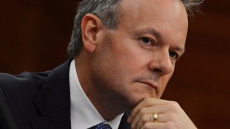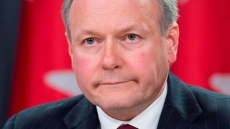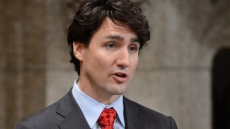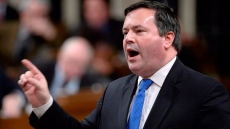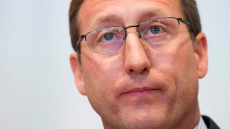WASHINGTON — The last few days have shown vivid differences in the way the leaders of Canada and the United States discuss terrorism and the threat posed by Islamist fighters.
One raises the alert level. The other dials it down.
It's been like a linguistic laboratory, with the chance to compare the choice of words from Prime Minister Stephen Harper and U.S. President Barack Obama over a similar time period.
In a one-week span the American leader issued his 2015 National Security Strategy and spoke to religious leaders, while the Canadian leader introduced new anti-terror legislation.
Harper wants people to know that the danger's on the rise. In just one snippet of one speech, the prime minister referred two or three times to an escalating threat.
"A great evil has been descending upon our world, an evil which has been growing more and more powerful: violent jihadism," the prime minister said in a Jan. 30 speech on new anti-terror legislation.
"(It) is one of the most dangerous enemies our world has ever faced. In parts of Asia and Africa, jihadists are finding shelter in failed states and ungoverned territories.
"And under their influence attacks and plots outside these regions have become more frequent and more dangerous in Australia, in France and in Belgium just recently, and of course here at home in Canada. We cannot avoid the stark reality. Jihadist terrorism is not a future possibility, it is a present reality."
That same stark message was driven home in the latest weekly video posted online by his office, the narrator describing a "growing threat" to Canada and Canadian families.
The U.S. administration, on the other hand, warns against fear.
In introducing the latest U.S. National Security Strategy, Susan Rice said she knows the risks because she begins every morning with a briefing on issues like terrorism, the Arab uprisings, Russian aggression, Ebola, and cyber-attacks.
"But too often, what's missing here in Washington is a sense of perspective. Yes, there is a lot going on. Still, while the dangers we face may be more numerous and varied, they are not of the existential nature we confronted during World War Two or during the Cold War," the national security adviser said in a speech.
"We cannot afford to be buffeted by alarmism in a nearly instantaneous news cycle."
Terrorism figured prominently in the security strategy, but only as one big issue among many others. It mentioned terrorism 37 times. It also mentioned other destabilizing issues, like climate change 19 times, cybersecurity 19 times, poverty 15 times and disease or Ebola 17 times.
The president wrote the introduction to the document. He mentioned leading a coalition to defeat terrorists, then issued a request — for America not to over-react.

"As powerful as we are and will remain, our resources and influence are not infinite," he wrote.
"And in a complex world, many of the security problems we face do not lend themselves to quick and easy fixes. The United States will always defend our interests and uphold our commitments to allies and partners. But, we have to make hard choices among many competing priorities, and we must always resist the over-reach that comes when we make decisions based upon fear."
When talking about Islam, both leaders have been careful to avoid slandering an entire religion.
Harper has in the past referred to the threat of Islamicism, but in his recent remarks he's spoken more specifically of violent jihadists. For its part, the White House talks about people with a warped interpretation of Islam.
Obama was criticized by opponents this week for the way he made that distinction, between violent individuals and their faith. He blasted ISIL as a "death cult," then explained why it wasn't specific to Islam.
He said history offers plenty of examples of people using religion to justify ugly deeds. He mentioned post-independence India, and examples from Christianity during the Crusades, the Spanish Inquisition and the Jim Crow era.
"No god condones terror," Obama said.
The leaders do face different political realities.
In the U.S., terrorism is a losing issue for the president's party — voters prefer Republicans by 20 percentage points on that issue, according to Gallup pollsters. Obama promised to wind down the war on terror when he was first elected, and his presidency is in its final phase.
In Canada, yet another polling firm this week described terrorism as a winning issue for the prime minister's party. And Harper faces re-election in nine months.
